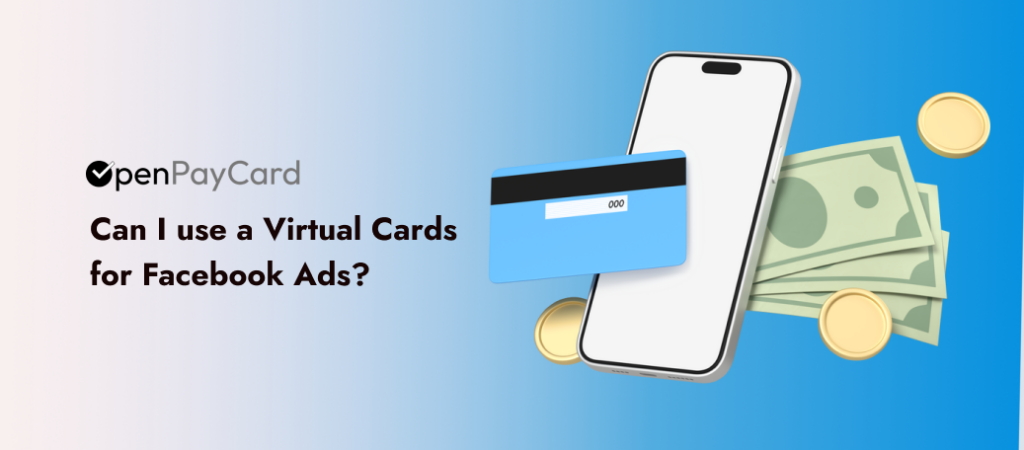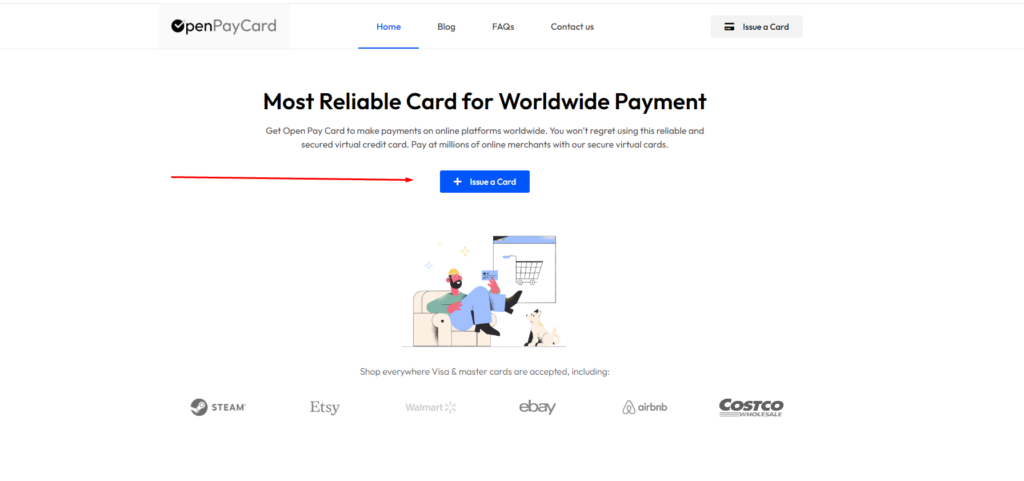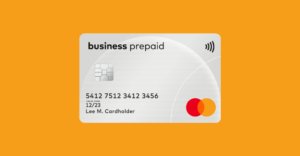Absolutely!
Facebook Run ads can be paid for with a virtual credit card.
At present, there are many merchants that provide virtual credit card services on the network. Facebook as of now doesn’t need the card to be in the name of that person using the account. You can use virtual credit cards/payment services like Openpaycard to make payments Facebook Ads.

This article delves into the feasibility of using virtual cards for Facebook Ads, outlining the benefits, considerations, and steps to utilize this modern payment method effectively.
it’s possible to use the same credit card for various Virtual Cards for Facebook Ads, Absolutely, yes .even if they belong to different clients. However, be mindful that Facebook might scrutinize accounts exhibiting unusual activities, such as numerous accounts linked to a single payment method
Here are some points to keep in mind:
- Facebook accepts payment through various payment methods, including credit/debit cards, PayPal, and Facebook Ad coupons.
- You can use a virtual card that supports online transactions to make payment for Facebook Ads.
- Ensure that the virtual card you are using is valid and has sufficient balance to cover the ad costs.
- Some virtual card providers may have restrictions on international payments or recurring billing, so it’s essential to check with your provider.
- It’s important to monitor your virtual card statement to ensure that the payment has been processed correctly.
Cards for Facebook advertising
Virtual cards play a pivotal role in digital advertising by providing a secure and manageable means of conducting transactions online. Their use in Facebook ads campaigns, in particular, has shown to improve both the security and efficiency of ad spend.
How Virtual Cards Work
Virtual cards function similarly to traditional debit or credit cards but are designed for online use. They are typically issued instantly by providers and can be used immediately for online purchases, including funding Facebook ad campaigns.
Benefits of Using Virtual Cards for Facebook Ads
Enhanced Security: Virtual cards offer a secure way to make payments online, often with customizable spending limits and the ability to lock or delete the card after use.
Better Budget Management: Advertisers can set precise budgets for campaigns by allocating specific amounts to virtual cards.
Easier International Payments: Virtual cards can simplify the process of making international payments, which is particularly beneficial for global ad campaigns.
Top Virtual Cards for Facebook Ads
OpenPayCard: A standout option for Facebook advertisers, offering ease of use, robust security features, and excellent customer support.
Other Leading Virtual Card Providers: We also explore other top providers that offer competitive features for digital advertising needs.
Choosing the Right Virtual Card for Your Needs
Selecting the right virtual card involves considering factors such as fees, security features, and ease of use. We provide a guide on comparing options to find the best fit for your Facebook ad campaigns.
Setting Up a Virtual Debit Cards for Facebook Ads
To avoid any issues, here are a few best practices to follow when using the same credit card for multiple ad accounts:
- Clearly label each ad account with the name of the corresponding client to avoid any confusion.
- Set up a separate payment method for each client if possible to avoid any issues with flagged accounts.
- Monitor your billing and payment activity regularly to ensure there are no unusual charges or activity.
- Communicate with your clients about billing and payments to ensure they are aware of the process and can provide any necessary information or feedback.
Ultimately, it’s important to ensure that you are complying with Facebook’s advertising policies and guidelines, including their policies on payment and billing.
In summary, Facebook Ads does allow the use of the same credit card for multiple ad accounts, but it’s important to be aware of potential issues and follow best practices to avoid any problems.
✅ Examples:
- A marketing agency employs a single credit card to manage payments for various clients’ ad accounts. They meticulously label each account according to the respective client’s name and consistently oversee the billing activities to guarantee smooth and error-free transactions..
- A freelancer uses their personal credit card to pay for multiple ad accounts for different clients. They set up a separate payment method for each client whenever possible and communicate regularly with their clients about billing and payments.
- A small business owner uses their business credit card to pay for their own ad account as well as ad accounts for other businesses they manage. They are careful to monitor billing activity and communicate with the other business owners about payment and billing processes.

How can I pay for Facebook Ads since I don’t have credit card?
You can pay for Facebook ads by creating personal admanager account from your profile. It should not be from business manager account.
There are a few ways to pay for Facebook Ads without using a credit card. You can use Openpaycard, for example, or you can set up a billing system through Facebook itself. You can also use a service like openpaycard.com , which allows you to pay for your Facebook Ads with a Credit Card .
Facebook has 2 types of Admanager accounts-
A. Personal Ad Manager
The Personal Ad Manager is established directly from your personal profile and can optionally be linked to a Business Manager account. This type of Ad Manager allows for payments to be made using a variety of methods, including debit cards, credit cards, net banking, Openpaycard. Users have the flexibility to either link their cards or preload funds using any of these payment options.
B. Business Ad Manager
Contrastingly, the Business Ad Manager is specifically set up within the Facebook Business Manager Account and cannot originate from a personal profile. This version is tailored for business-related functionalities, only accepting payments via credit card. Charges are applied post the generation of an invoice by Facebook’s billing system.
The Business Ad Manager boasts additional features such as the ability to utilize offline event custom audiences and upload data files for creating custom audiences, options not available to Personal Ad Manager users.
Therefore, individuals not utilizing features like pixel tracking or uploaded audiences have the convenience of setting up a Personal Ad Manager directly from their profile, benefitting from the broader range of payment methods. Conversely, if the need arises for advanced business features, setting up an Ad Manager through the Facebook Business Manager is necessary, with the limitation of credit card payments only.
Most Reliable Card for Worldwide Payment
Get OpenPayCard to make payments on online platforms worldwide. You won’t regret using this reliable and secured virtual credit card. Pay at millions of online merchants with our secure virtual cards.
Virtual payment card designed for Facebook Ads
OpenPayCard.com: OpenPayCard.com offers versatile virtual cards that can be efficiently used for Virtual Cards for Facebook Ads. Their cards are designed to be user-friendly, secure, and compatible with various online transactions.
It’s important to check OpenPayCard’s specific features, VCC for Facebook Ads such as international payment capabilities and any transaction limits, to ensure it aligns with your advertising needs.
✅ If you need further assistance with Facebook Ads or Google Ads, feel free to visit dotmirror.com and request a free audit of your campaigns.
In conclusion, Virtual cards are an invaluable tool for Facebook advertisers, offering a combination of security, budget management, and convenience. By choosing the right virtual card provider, such as OpenPayCard, advertisers can enhance the efficiency and effectiveness of their ad campaigns.This is super easy to set up in Facebook Business Manager.
FAQs
What are the main benefits of using virtual cards for Facebook ads?
The main benefits include enhanced security, since virtual cards protect your main banking details from potential fraud; precise budget management, as they allow for specific spending limits on campaigns; and the facilitation of easier international payments, which is particularly beneficial for global ad campaigns.
Virtual cards also offer quick setup and immediate use, making them a flexible option for fast-paced digital advertising environments.
How do I choose the right virtual card provider for my needs?
Choosing the right virtual card provider involves considering several factors: the fees associated with transactions and card maintenance, the ease of managing and generating new cards, the security features offered (such as customizable spending limits and the ability to freeze or delete cards), and the provider’s customer support quality.
It’s also wise to consider reviews from other digital advertisers and any additional features that might be beneficial, such as integration with accounting software or rewards programs.
Can virtual cards be used for other digital advertising platforms?
Yes, virtual cards can be used across various digital advertising platforms beyond Facebook, including Google Ads, LinkedIn, Twitter, and Instagram advertising platforms.
They offer the same benefits of security, budget management, and ease of international payments, making them a versatile tool for a wide range of digital marketing campaigns.
What are the common pitfalls in using virtual cards for Facebook ads and how can they be avoided?
Common pitfalls include failing to monitor and adjust the spending limits on virtual cards, which can lead to interrupted campaigns if funds run out, and not keeping track of which card is used for which campaign, leading to potential confusion in budget tracking. These can be avoided by implementing a robust tracking system, regularly reviewing card limits and expenditures, and ensuring clear labeling and documentation of each card’s purpose and associated campaigns.
What future developments can we expect in the use of virtual cards in digital advertising?
The future of virtual cards in digital advertising likely includes greater integration with advertising platforms and analytics tools, enabling more automated budget management and campaign optimization. We might also see advancements in security features to further protect against fraud. Additionally, as cryptocurrencies and blockchain technology continue to evolve, there may be developments in how virtual cards can be funded and used, potentially opening new avenues for digital ad payments and financial management within advertising platforms.








